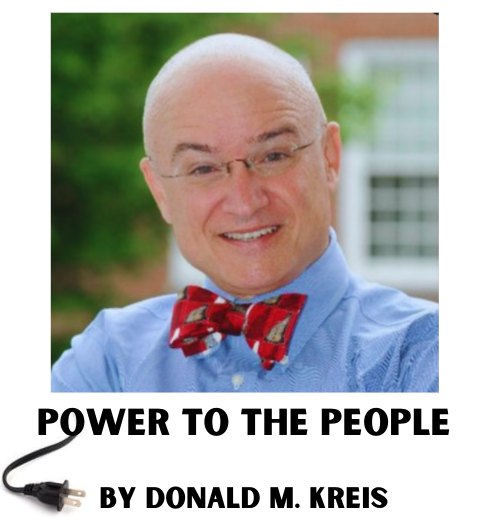Power to the People is a column by Donald M. Kreis, New Hampshire’s Consumer Advocate. Kreis and his staff of four represent the interests of residential utility customers before the NH Public Utilities Commission and elsewhere.
By DONALD M. KREIS, Power to the People
For gas customers of Liberty Utilities, it was a deal too good to be true.
The deal I am talking about is the utility’s annual offering of a “fixed price option” to its New Hampshire customers as the cold winter approaches. This is a phenomenon familiar to fuel oil customers; as foliage season unfolds, you get a letter from your oil company offering you a price that won’t vary over the course of the winter.
Households are understandably averse to the risks arising out of volatile markets for commodities like fuel oil or natural gas. Especially now, with wholesale prices soaring. So consumers quite naturally gravitate toward fixed-price plans, which are designed to cost a bit more, compared the prevailing market price as cold weather sets in.
When you say yes to such a fuel oil plan, you’re paying the cost of transferring the risk of higher wholesale costs to your supplier. This is rational customer behavior.
So, what went wrong at Liberty? It started when the company sent its natural gas customers a letter in early October. It offered a fixed price of 92 cents per therm (except for Keene customers, who were offered $1.89 per therm, because customers there use a combination of propane and compressed natural gas since Keene is not connected to the rest of Liberty’s natural gas pipeline network).
Liberty has been offering a fixed price option for years, always designing the program so as to make the price two cents higher than the regular price, which will vary month-to-month based on market conditions. Unfortunately, October is when the wholesale market for natural gas went haywire.
Here’s the upshot: By the time Liberty’s winter cost-of-gas rates came before the Public Utilities Commission (PUC) for approval on October 23, the Fixed Price Option was actually cheaper than the regular, variable price of natural gas ($1.13 per therm, except in Keene where the regular price is $1.99).
You got that right! Liberty was actually offering its customers a discount for shielding themselves from the risk of market volatility. It’s not supposed to work that way.
By late October, about 12 percent of Liberty’s natural gas customers in New Hampshire had accepted the fixed-price offer. I have no idea how many of them knew what a windfall of a deal they were getting.
I asked the PUC to nix the whole scheme – and, to its great credit, that’s exactly what the PUC did on October 27. I’ve been trashing the PUC pretty consistently for several months, so it’s important to give the regulators credit when they screw up some courage and do the right thing.
At page 10 of its order, the PUC told Liberty to offer the 12 percent two options: Sign up for a new-and-improved fixed price option, one that really is two cents more expensive than the regular rate, or drop the fixed price option altogether. It was a gutsy directive from the PUC because it will likely take the fall when customers hear from Liberty that their previously agreed-to to-good-to-be-true deal is off.
So, why is the PUC’s decision actually good for customers?
The answer arises out of the fact that Liberty is a public utility. If your fuel dealer, which is unregulated, offers you a fixed price that produces a windfall for those who sign up, the losers are the owners of the fuel dealer. (That hardly ever happens, for the same reason the house generally wins at the casinos on the Strip in Las Vegas.)
It doesn’t work that way when it comes to natural gas supplies purchased by a public utility like Liberty. If Liberty’s fixed price option produces a windfall for those who take the option, the rest of Liberty’s natural gas customers pick up the tab.
Let me put that another way. If you sign up for a fixed price from a fuel oil dealer, you’re betting against the house. But if you sign up for a fixed price deal from a public utility, you’re betting against your neighbors.
That probably explains why the state’s other natural gas utility, Unitil, doesn’t have a fixed price option. It presumably sees no reason to cause its customers to bet against one another in quest of affordable heat.
As you ponder all of that, keep in mind that the cost-of-gas rates we are talking about do not comprise all of your utility bill if you are a natural gas customer of Liberty or Unitil. You pay other charges that compensate the utilities for the distribution infrastructure they maintain – indeed, that’s how they make their money.
At the risk of sounding like Mark Zuckerberg, the meta theme here is risk. I’ve said it before and I will say it again: Everybody talks about keeping rates as low as possible, but the rubber-hits-road question is how much risk to place on the backs of ratepayers versus what risks should profit-maximizing shareholders of regulated and unregulated businesses in the energy sector shoulder.
My answer is that risk almost always belongs with the shareholders, because they reap huge rewards when things go right. But the worst scenario of all is when the risk allocation pits customers against customers. That’s why the PUC did the right thing in rejecting Liberty’s fixed-price natural gas option as a classic example of rates that fail the “just and reasonable” test required by the New Hampshire law governing utility prices.






